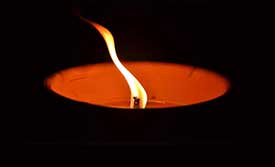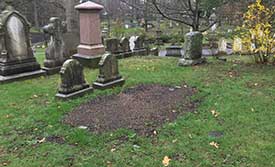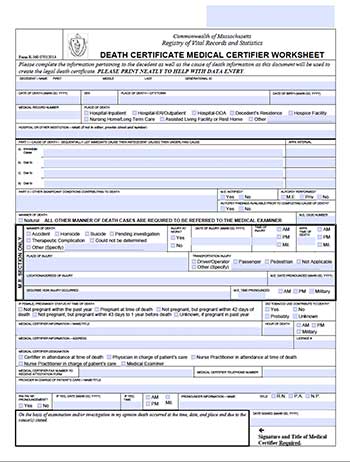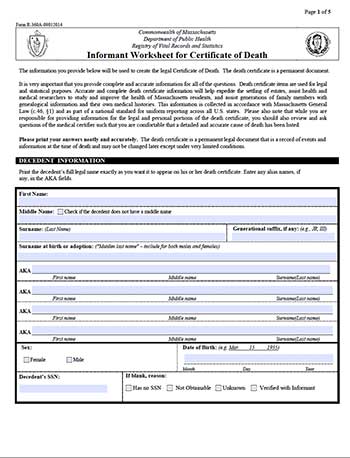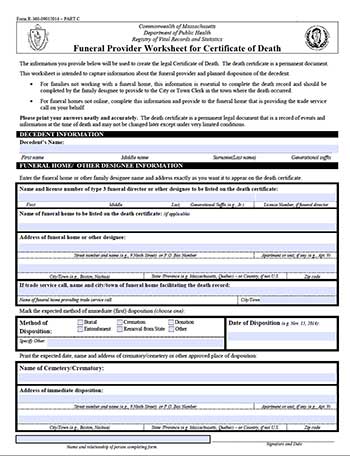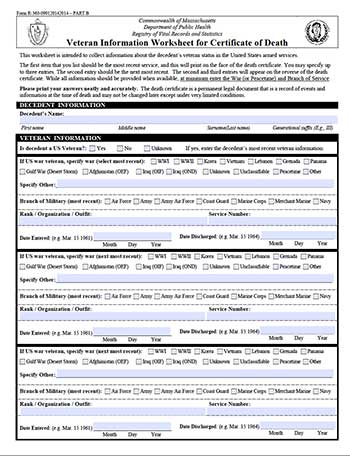Guidelines for Burial or Cremation without a Funeral Director
Caring for your own dead can be immensely rewarding and help ease the pain of grief. It is also emotionally demanding, and, because of the widespread misunderstanding of the law in Massachusetts, it can be difficult. The law clearly permits persons to care for their own dead. The state Executive Office of Health and Human Services (EOHHS) has provided written guidelines to the city and town clerks and boards of health advising them that the care of one’s own dead is legal. Even the Board of Registration in Embalming and Funeral Directing has agreed to withdraw its objections to issuance of burial permits to persons other than undertakers.
Guidelines for Burial or Cremation Without a Funeral Director
Download a printable PDF of the Guidelines for Burial or Cremation Without a Funeral Director
Caring for your own dead can be immensely rewarding and help ease the pain of grief. It is also emotionally demanding, and, because of the widespread misunderstanding of the law in Massachusetts, it can be difficult. The law clearly permits persons to care for their own dead. The state Executive Office of Health and Human Services (EOHHS) has provided written guidelines to the city and town clerks and boards of health advising them that the care of one’s own dead is legal. Even the Board of Registration in Embalming and Funeral Directing has agreed to withdraw its objections to issuance of burial permits to persons other than undertakers.
Plan Ahead
If you are considering caring for your own dead, we recommend that you plan carefully and communicate in advance with the agencies you will have to deal with — hospital, hospice, nursing home, board of health (Burial Agent), crematory, cemetery, etc. — to be sure they will not cause difficulties because of their own uncertainties about the law. Please notify FCAEM if any agency tries to obstruct; we will be glad to help.
We also suggest that you consult Final Rights: Reclaiming the American Way of Death by Josh Slocum and Lisa Carlson. Order the book here and support the work of the national FCA.
Here are some things you will need to know:
Death Certificate
“In September 2014, the Massachusetts Registry of Vital Records implemented an online system for death certificates and burial permits. An individual who chooses to make arrangements for the final disposition of a body has the same responsibilities and obligations as a funeral director, including timely reporting and filing of death certificates and permits.” [Guide: Issues to consider in preparing for disposition of decedents]
“Prior to moving a deceased person, a family designee must obtain documentation from the certifying physician or nurse practitioner. The document received will be different, depending on whether the certifier uses the online Electronic Death Registration System (EDRS) or whether they use the manual fax attestation process. In most cases, the family designee will receive a Certifier Worksheet from an offline certifier or an Attestation Copy form from an online certifier, but this may vary somewhat by practice and facility. If a Registered Nurse Pronouncement of Death Form (R-312) is used to move the remains initially, a certification of death must still be obtained from the certifier.
The family designee will then work with the City or Town Clerk in the community where the death occurred to complete an online record of death, by providing the Clerk with the Certifier Worksheet, Nurse Pronouncement Form, and a completed Informant Worksheet (see below) that will provide the legal and personal information about the decedent. The City or Town Clerk will enter the information into the EDRS, and release the electronic record to the burial agent for review prior to issuance of a burial permit.” [Guide: Issues to consider in preparing for disposition of decedents]
See “Coordinating the Completion of the Death Certificate” below for more information on the specific forms you will need to fill out.
For more information about the death certificate process, visit VIP EDRS – Families not Working with a Funeral Home.
Disposition/Removal Permit, formerly Burial Permit
The “Permit” is actually a permit to transport a body and dispose of it by burial, cremation or donation to a medical school. Once the Death Certificate is filed, the Permit is issued by the Burial Agent in the town where death occurred, even if cremation or burial will take place in another town. Even though it is legal to transport a body within the same town or city (from a Cambridge hospital to a home in Cambridge, for example) after receiving the Death Certificate but before obtaining a Permit, it is better to obtain the Permit before claiming a body from an institution such as a hospital. The law requires that you obtain a Permit before transporting a body across town or city lines.
Whenever possible, individuals who are not funeral directors and will be obtaining a burial permit for the final disposition of a body should notify the burial agent (usually the board of health or the town clerk) of the city or town before death occurs that a burial permit will be sought. To obtain a Permit, “a complete death record, with a Registered Nurse Pronouncement of Death form, where applicable, must be submitted to the burial agent prior to issuance of the permit (M.G.L. c.114, s.45). The family designee will work with the City or Town Clerk in the community where the death occurred to complete the electronic death record for submission to the burial agent. As soon as possible (preferably within 36 hours after death), a burial permit must be obtained. As soon as the electronic death record has been released to the burial agent, the family designee may obtain the permit, provided that the record and disposition plan is approved by the burial agent. Upon burial or cremation, the person in charge of the cemetery or crematorium will countersign the burial permit and return it to the issuing municipality.” [Guide: Issues to consider in preparing for disposition of decedents]
It would be wise (particularly in small towns that are unfamiliar with this) to call before death occurs and explain that you will be requiring a Permit for private disposal of a body. If the Burial Agent says they will refuse to issue a disposition permit to a person who is not a funeral director, document their refusal (in writing, if possible; otherwise by noting the exact time of your phone call or visit, and the name of the person you spoke with). Then call FCAEM at 617-859-7990. We will try to help. This is not an emergency line and is checked several times a week, which is why we recommend checking with the Burial Agent ahead of time.
Between Death and Cremation or Burial
Time is an obvious constraint in carrying out the care of your own dead. Nursing homes often want a body removed immediately, even in the middle of the night. It is important to plan ahead. (Most hospitals have a morgue with refrigerated storage and will store a body for a few days if they are not full.)
In the case of violent or unexplained death, the body will be turned over to a medical examiner or coroner and may be kept several days, which gives the family time to make preparations.
According to Lisa Carlson, a human body can be kept in a cool room for at least 24 hours before decomposition begins. Heat in the room should be turned off in winter, and air conditioning should be turned on in summer. Dry ice can be used in lieu of refrigeration. Some traditions keep the body at home or in a place of worship for up to three days.
It is unlikely that infectious diseases will be contracted from a dead body. However, anyone caring for their own dead should take the precaution of wearing rubber gloves and avoiding all contact of body fluids on unprotected skin. Soiled linens and clothes should be cleaned as they would be for a living person. Disposable material should be put into non-leaking plastic bags and disposed of with household rubbish. Durable equipment should be disinfected with a strong solution of bleach. Hand washing is an important way of limiting infection risk.
FCAEM can put you in touch with a home funeral guide who will be happy to answer any questions about after-death care of your loved one.
Unless the death has been attributed to a communicable disease, cremation cannot occur until 48 hours after death. [Guide: Issues to consider in preparing for disposition of decedents]
Unlike cremation, there is no requirement to hold a body before burial. It can take place as soon as the cemetery is ready.
Cremation
“Cremation requires an additional certificate from the medical examiner stating that they have viewed the body and that no further examination or judicial inquiry concerning the same is necessary… Unless the death has been attributed to a communicable disease, cremation cannot occur until 48 hours after death.” [Guide: Issues to consider in preparing for disposition of decedents]
Some crematories (Mount Auburn Cemetery crematory, for example) will store the body for all or part of the 48 hour waiting period, provided they have room. Ask if this is possible in your case. In eastern Massachusetts the crematory will arrange for the required medical examiner viewing. The yellow copy of the medical examiners bill is picked up at the crematory with the cremated remains. The $100 cremation authorization fee must then be sent in directly to the state. This is in addition to the crematory fee. See Office of the Chief Medical Examiner.
Alternative caskets (of fiberboard) with a body pouch (to contain any possible leaking fluids) are available from crematories.
Caskets for cremation must be made of combustible materials (no metal), not larger than 32” x 28”, and the name of the decedent must be put on the casket. The body must be transferred to the casket before entering cemetery grounds.
Be sure to call ahead to the crematory to make arrangements for a time of delivery of the body, as some crematories are more accommodating of do-it-yourself cases than others. Mount Auburn Cemetery and Crematory in Cambridge, Duxbury Crematory in Duxbury, and New Swedish Crematory in Worcester will accept a body for cremation or burial from anyone presenting a valid burial permit. We haven’t surveyed other crematories and cemeteries but expect that they will also be willing. Crematories in the western part of the state may have less experience with the law.
Order for Cremation or Interment Form
This form, required by the crematory or cemetery, is provided and filled out by the cemetery or crematory staff, and signed by the next of kin requesting cremation.
Order of next of kin: spouse, or, if none, then children (all adult children must sign, and if sending in authorization by fax it must be notarized and the original sent by mail, if from another country consulate should verify the identity).
See the next section on how to provide the required authorization for cremation ahead of time.
Declaration of Intent Regarding Cremation
Massachusetts’ case law requires that a crematory give priority to the written wishes of the deceased. A form called “Declaration of Intent Regarding Cremation” is available from crematories and, ideally, should be filled out by the dying person and notarized before death occurs.
If the form or its legal equivalent is not presented when the body is brought to the crematory, the crematory staff must follow the instructions of next-of-kin, beginning with the spouse, even if that person has had no contact with the deceased for years. Or , if there is no spouse all adult children must sign. Obviously this can lead to lengthy delays, and can lead to painful disputes among family and friends. We therefore strongly advise that the Declaration of Intent be filled out as part of your normal preplanning.
The Declaration of Intent provides an opportunity for the dying person to appoint someone to authorize the cremation, rather than relying on the rules for who is next of kin.
Scattering, Burial or Storage of Cremated remains
Once cremation is complete, the crematory will return the ashes, usually in a box. If you wish to buy an urn, you can purchase one from any funeral director. Cremated remains can also be kept in any container–in a beautiful pottery vase, for example, or in a box or container that was a favorite object of the decedent. They can be buried anywhere, in or out of a cemetery, or scattered in a particularly loved place. Some crematories have “columbaria,” or rooms with niches where ashes can be stored.
There is no restriction on the disposal of cremated remains in Massachusetts, except when they are buried in a cemetery. In that case, you must present the cemetery with a certificate from the crematory stating that the burial permit and the medical examiners’ certificate were duly presented.
For cremated remains to be buried at sea, there is no depth requirement but the ash scattering must take place at least three nautical miles offshore. [Guide: Issues to consider in preparing for disposition of decedents]
Burials
Containers and Outer Burial Containers
A box can be made of plywood for less than $100. A simple container for cremation, often called an “alternative container” can be obtained from a cooperative crematory or funeral director (Mount Auburn Crematory has one for $250). It will be a strong cardboard box, sometimes with a plywood base, and is designed to be destroyed during cremation. Containers for cremation must be combustible, not metal.
Caskets for burial can be homemade, made by a carpenter or cabinetmaker, or bought from cooperative funeral directors, and they are also now available directly from retail stores and online. See Funeral Consumers Alliance: Caskets – How to Save On Them for tips on saving on caskets.
Most cemeteries require that the casket be placed inside a concrete grave liner to prevent the ground from subsiding. Some cemeteries offer them for sale, but otherwise you must buy one from a funeral director. In Massachusetts they cost anywhere from $400 to $1,000, installed. The best deal is almost always from the cemetery, if they sell grave liners.
“Burial Vaults” are more expensive, more elaborate grave liners that are usually sold by funeral homes. It is often claimed that they protect the casket, but there is no claim that they protect the body. All you need is a simple grave liner to meet the cemetery’s requirements.
Cemetery charges for opening a grave vary considerably but will always amount to several hundred dollars, not counting lot and liner. Most cemeteries do not permit anyone other than their own staff to open or fill a grave.
Check with your cemetery about regulations regarding markers, monuments and plantings, and about the charge for grave maintenance.
Home Burial
Burial in Massachusetts usually takes place in a recognized municipal or private cemetery, but private-property burial can be permitted after a process that requires approval by the local health department and local city or town government, establishing a cemetery corporation, and meeting certain environmental standards. After burial the burial must be noted on the deed for the property before the property can be transferred. See Guide: Issues to consider in preparing for disposition of decedents.
Burial at sea
Burial at sea is regulated under 40 CFR § 229.1 in federal waters and MGL Chapter 38, Section 14 in state waters. See [Guide: Issues to consider in preparing for disposition of decedentsand U.S. EPA: Burial at Sea.
Inland water burials are governed according to the Clean Water Act and require a permit from the appropriate local and state agencies.
Green Burial
A “green” burial or natural burial is a method of final disposition of a body with fewer environmental impacts than traditional burial. Generally, a green burial means that the body is not embalmed, no metal or hard wood are used to make the casket, and no grave liner or vault is used. The gravesite may have a low profile grave marker or no marker at all… [T]here is no law requiring a body to be embalmed, … people interested in a green burial are still required to obtain a burial permit from their local city or town… [and] there are no standards for green burials in Massachusetts and exclusively green cemeteries do not yet exist in the state. Therefore, anyone interested in green burials should speak directly with a cemetery about performing a green burial. From Guide: Issues to consider in preparing for disposition of decedents.
See also Green Burial Massachusetts.
Body Donation
Although body donation does not, strictly speaking, come under the heading of caring for your own dead, it does provide an alternative to conventional cremation and burial. If you wish to be a body donor, contact a medical or dental school and ask about their donation program. The Massachusetts medical schools require the donation to be arranged by the donor personally before death, not by the next-of-kin. Always make alternative plans in case the school is unable to accept the body.
Requirements of schools vary, but here are some questions you should ask:
How soon after death does the school require the body to be delivered?
Does the school arrange for transportation, and does it assume all or part of the costs?
In the case of body donation, ask how long the body will be kept, and whether the body will be cremated, buried or returned to next of kin. Does the school provide a funeral or memorial service?
What arrangements can be made if death occurs abroad or in another part of the U.S.?
There are some restrictions on the acceptance of bodies. Ask about them.
Coordinating the Completion of the Death Certificate
The Medical Certifier Worksheet must be completed by the certifying physician or medical examiner prior to the release of the body.
You will work with the city/town clerk for data entry on information from the following worksheets into the ERDS, and then obtain a burial permit.
Use black ink. You may not be able to answer all of the questions. In that case, write “Unknown.” Do not leave any blanks. Be accurate. Do not cross anything out or use whiteout. We suggest making a copy of the original and filling in the copy as best you can. Then copy it accurately onto the original and final form.
The following suggestions on filling out the forms were taken from the Quick Start Guide for City/Town Clerks.
Informant Worksheet for Certificate of Death
Name of Decedent. Enter the full legal name. Generational ID is a name suffix, such as “Jr.” Surname at birth or adoption is required of all decedents, male or female, and is commonly known as “maiden” surname. If there is no middle name, check the “No middle name” checkbox.
AKA. If the decedent had aliases (“Also Known As” or “AKA” names), enter the number of names you would like to add.
Pronouncement performed. This field refers only to the manual RN/PA/NP pronouncement form that the family designee may receive, typically in deaths that occur in a residence or nursing home.
Residence. Enter the decedent’s last legal residence address.
Last Spouse. If marital status is anything other than “never married,” you will enter the information for the last known spouse: legal first and last name and surname at birth or adoption, which is required for both males and females (formerly “maiden” surname). Enter middle name if known.
Parents. For each parent, enter the legal first and last names, as well as the surname at birth or adoption, which is required for both males and females (formerly “maiden” surname). Enter middle name if known.
Veteran Status. Answer Y or N. Note that this field is no longer limited to “war” veteran. If yes, then complete the Veteran Information Worksheet and attach it to the Informant Worksheet.
Ethnicity. You must check at least one selection in both the Decedent’s Ethnicity and Decedent’s Race sections, but more than one selection can be made in each column, if applicable. Because it is possible that multiple races will not fit neatly on the death certificate, an additional field, Decedent’s Death Certificate Race, allows the informant to specify how they would like the race to print on the front of the death certificate. All other race and ethnicity information will appear on the reverse of the death certificate.
Decedent’s Education. Choose a category that best represents the decedent’s level of education. If the decedent was not educated in the United States, select the category that most closely reflects the educational level achieved.
Decedent’s Occupation and Industry. Enter detail about the decedent’s latest occupation and industry. Do not enter “retired” or “not working.” Enter “Retired Mechanical Engineer” or “State K-9 Police Officer.” You may refer to this handbook if you need guidance on entering occupation and industry.
Veteran Information Worksheet for Certificate of Death
War. Select the most recent war in which the decedent served as a U.S. veteran from the pick-list. If the veteran was a peacetime veteran, choose “Peacetime.” If the conflict is not listed, you may choose “Other” and specify.
Branch of Service. Select the most recent U.S. branch of service in which the veteran served. This field and “War” are the only two required fields for veterans.
Rank/Organization/Outfit. Enter the rank that corresponds to the war entry. If there were more than one rank achieved, enter the highest rank. You may also add any additional information about the veteran’s military organization, detail or outfit.
Funeral Provider Worksheet for Certificate of Death
Name and license number of type 3 funeral director or other designee to be listed on the death certificate. Enter your name.
License Number. Enter the relationship to the decedent (e.g, “Spouse”).
Name of funeral home to be listed on the death certificate: (if applicable).Write “n/a”
Address of Funeral Home or Other Designee. Enter your residence address.
Trade Service Call. You will not use this field.
Method of Disposition. Indicate the immediate disposition of the decedent. If not in list, check “Other” and write in an appropriate disposition (e.g., “Holding”).
Date of Disposition. This should be the date of the expected immediate disposition. If “holding” enter the date released to the burial agent or the date the decedent is moved to the holding facility (do not enter a date prior to release to the burial agent).
Address of Facility. If the disposition is “Donation” or “Other,” enter the physical location, not a mailing address.
Plan Ahead
If you are considering caring for your own dead, we recommend that you plan carefully and communicate in advance with the agencies you will have to deal with–hospital, hospice, nursing home, board of health (Burial Agent), crematory, cemetery, etc. — to be sure they will not cause difficulties because of their own uncertainties about the law. Please notify FCAEM if any agency tries to obstruct; we will be glad to help.
We also suggest that you consult Final Rights: Reclaiming the American Way of Death by Josh Slocum and Lisa Carlson. Click the link above to order the book and support the work of the national Funeral Consumers Alliance
Death Certificate
“Prior to moving a deceased person, a family designee must obtain documentation from the certifying physician or nurse practitioner. The document received will be different, depending on whether the certifier uses the online Electronic Death Registration System (EDRS) or whether they use the manual fax attestation process. In most cases, the family designee will receive a Certifier Worksheet from an offline certifier or an Attestation Copy form from an online certifier, but this may vary somewhat by practice and facility. If a Registered Nurse Pronouncement of Death Form (R-312) is used to move the remains initially, a certification of death must still be obtained from the certifier.
“The family designee will then work with the City or Town Clerk in the community where the death occurred to complete an online record of death, by providing the Clerk with the Certifier Worksheet, Nurse Pronouncement Form, and a completed Informant Worksheet that will provide the legal and personal information about the decedent. The City or Town Clerk will enter the information into the EDRS, and release the electronic record to the burial agent for review prior to issuance of a burial permit.” —From the Guide: Issues to consider in preparing for disposition of decedents
See “Coordinating the Completion of the Death Certificate” elsewhere on this page for more information on the specific forms you will need to fill out.
For more information about the death certificate process, visit VIP EDRS – Families not Working with a Funeral Home.
Disposition/Removal Permit (Formerly Burial Permit)
The “Permit” is actually a permit to transport a body and dispose of it by burial, cremation or donation to a medical school. Once the Death Certificate is filed, the Permit is issued by the Burial Agent in the town where death occurred, even if cremation or burial will take place in another town. Even though it is legal to transport a body within the same town or city (from a Cambridge hospital to a home in Cambridge, for example) after receiving the Death Certificate but before obtaining a Permit, it is better to obtain the Permit before claiming a body from an institution such as a hospital. The law requires that you obtain a Permit before transporting a body across town or city lines.
Whenever possible, individuals who are not funeral directors and will be obtaining a burial permit for the final disposition of a body should notify the burial agent (usually the board of health or the town clerk) of the city or town before death occurs that a burial permit will be sought. To obtain a Permit, “a complete death record, with a Registered Nurse Pronouncement of Death form, where applicable, must be submitted to the burial agent prior to issuance of the permit (M.G.L. c.114, s.45). The family designee will work with the City or Town Clerk in the community where the death occurred to complete the electronic death record for submission to the burial agent. As soon as possible (preferably within 36 hours after death), a burial permit must be obtained. As soon as the electronic death record has been released to the burial agent, the family designee may obtain the permit, provided that the record and disposition plan is approved by the burial agent. Upon burial or cremation, the person in charge of the cemetery or crematorium will countersign the burial permit and return it to the issuing municipality.” —From the Guide: Issues to consider in preparing for disposition of decedents
It would be wise (particularly in small towns that are unfamiliar with this) to call before death occurs and explain that you will be requiring a Permit for private disposal of a body. If the Burial Agent says they will refuse to issue a disposition permit to a person who is not a funeral director, document their refusal (in writing, if possible; otherwise by noting the exact time of your phone call or visit, and the name of the person you spoke with). Then call FCAEM at 617-859-7990. We will try to help. This is not an emergency line and is checked several times a week, which is why we recommend checking with the Burial Agent ahead of time.
Between Death and Cremation or Burial
In the case of violent or unexplained death, the body will be turned over to a medical examiner or coroner and may be kept several days, which gives the family time to make preparations.
According to Lisa Carlson, a human body can be kept in a cool room for at least 24 hours before decomposition begins. Heat in the room should be turned off in winter, and air conditioning should be turned on in summer. Dry ice can be used in lieu of refrigeration. Some traditions keep the body at home or in a place of worship for up to three days.
It is unlikely that infectious diseases will be contracted from a dead body. However, anyone caring for their own dead should take the precaution of wearing rubber gloves and avoiding all contact of body fluids on unprotected skin. Soiled linens and clothes should be cleaned as they would be for a living person. Disposable material should be put into non-leaking plastic bags and disposed of with household rubbish. Durable equipment should be disinfected with a strong solution of bleach. Hand washing is an important way of limiting infection risk.
FCAEM can put you in touch with a home funeral guide who will be happy to answer any questions about after-death care of your loved one.
Unless the death has been attributed to a communicable disease, cremation cannot occur until 48 hours after death. See the Guide: Issues to consider in preparing for disposition of decedents.
Unlike cremation, there is no requirement to hold a body before burial. It can take place as soon as the cemetery is ready.
Cremation
“Cremation requires an additional certificate from the medical examiner stating that they have viewed the body and that no further examination or judicial inquiry concerning the same is necessary… Unless the death has been attributed to a communicable disease, cremation cannot occur until 48 hours after death.” — Guide: Issues to consider in preparing for disposition of decedents.
Some crematories (Mount Auburn Cemetery crematory, for example) will store the body for all or part of the 48 hour waiting period, provided they have room. Ask if this is possible in your case. In eastern Massachusetts the crematory will arrange for the required medical examiner viewing. The yellow copy of the medical examiners bill is picked up at the crematory with the cremated remains. The $100 cremation authorization fee must then be sent in directly to the state. This is in addition to the crematory fee. See Office of the Chief Medical Examiner.
Alternative caskets (of fiberboard) with a body pouch (to contain any possible leaking fluids) are available from crematories.
Caskets for cremation must be made of combustible materials (no metal), not larger than 32” x 28”, and the name of the decedent must be put on the casket. The body must be transferred to the casket before entering cemetery grounds.
Be sure to call ahead to the crematory to make arrangements for a time of delivery of the body, as some crematories are more accommodating of do-it-yourself cases than others. Mount Auburn Cemetery and Crematory in Cambridge, Duxbury Crematory in Duxbury, and New Swedish Crematory in Worcester will accept a body for cremation or burial from anyone presenting a valid burial permit. We haven’t surveyed other crematories and cemeteries, but expect that they will also be willing. Crematories in the western part of the state may have less experience with the law.
Order for Cremation or Interment Form
This form, required by the crematory or cemetery, is provided and filled out by the cemetery or crematory staff, and signed by the next of kin requesting cremation.
Order of next of kin: spouse, or, if none, then children (all adult children must sign, and if sending in authorization by fax it must be notarized and the original sent by mail, if from another country consulate should verify the identity).
See the next section on how to provide the required authorization for cremation ahead of time.
Declaration of Intent Regarding Cremation
Massachusetts’ case law requires that a crematory give priority to the written wishes of the deceased. A form called “Declaration of Intent Regarding Cremation” is available from crematories and, ideally, should be filled out by the dying person and notarized before death occurs.
If the form or its legal equivalent is not presented when the body is brought to the crematory, the crematory staff must follow the instructions of next-of-kin, beginning with the spouse, even if that person has had no contact with the deceased for years. Or , if there is no spouse all adult children must sign. Obviously this can lead to lengthy delays, and can lead to painful disputes among family and friends. We therefore strongly advise that the Declaration of Intent be filled out as part of your normal preplanning.
The Declaration of Intent provides an opportunity for the dying person to appoint someone to authorize the cremation, rather than relying on the rules for who is next of kin.
Scattering, Burial or Storage of Cremated remains
Once cremation is complete, the crematory will return the ashes, usually in a box. If you wish to buy an urn, you can purchase one from any funeral director. Cremated remains can also be kept in any container–in a beautiful pottery vase, for example, or in a box or container that was a favorite object of the decedent. They can be buried anywhere, in or out of a cemetery, or scattered in a particularly loved place. Some crematories have “columbaria,” or rooms with niches where ashes can be stored.
There is no restriction on the disposal of cremated remains in Massachusetts, except when they are buried in a cemetery. In that case, you must present the cemetery with a certificate from the crematory stating that the burial permit and the medical examiners’ certificate were duly presented.
For cremated remains to be buried at sea, there is no depth requirement but the ash scattering must take place at least three nautical miles offshore.
Burials
Containers and Outer Burial Containers
A box can be made of plywood for less than $100. A simple container for cremation, often called an “alternative container” can be obtained from a cooperative crematory or funeral director (Mount Auburn Crematory has one for $250). It will be a strong cardboard box, sometimes with a plywood base, and is designed to be destroyed during cremation. Containers for cremation must be combustible, not metal.
Caskets for burial can be homemade, made by a carpenter or cabinetmaker, or bought from cooperative funeral directors, and they are also now available directly from retail stores and online. See Funeral Consumers Alliance: Caskets – How to Save On Them for tips on saving on caskets.
Most cemeteries require that the casket be placed inside a concrete grave liner to prevent the ground from subsiding. Some cemeteries offer them for sale, but otherwise you must buy one from a funeral director. In Massachusetts they cost anywhere from $400 to $1,000, installed. The best deal is almost always from the cemetery, if they sell grave liners.
“Burial Vaults” are more expensive, more elaborate grave liners that are usually sold by funeral homes. It is often claimed that they protect the casket, but there is no claim that they protect the body. All you need is a simple grave liner to meet the cemetery’s requirements.
Cemetery charges for opening a grave vary considerably but will always amount to several hundred dollars, not counting lot and liner. Most cemeteries do not permit anyone other than their own staff to open or fill a grave.
Check with your cemetery about regulations regarding markers, monuments and plantings, and about the charge for grave maintenance.
Home Burial
Burial in Massachusetts usually takes place in a recognized municipal or private cemetery, but private-property burial can be permitted after a process that requires approval by the local health department and local city or town government, establishing a cemetery corporation, and meeting certain environmental standards. After burial the burial must be noted on the deed for the property before the property can be transferred.
Burial at sea
Burial at sea is regulated under 40 CFR § 229.1 in federal waters and MGL Chapter 38, Section 14 in state waters. See US Environmental Protection Agency’s: Burial at Sea.
Inland water burials are governed according to the Clean Water Act and require a permit from the appropriate local and state agencies.
Green Burial
A “green” burial or natural burial is a method of final disposition of a body with fewer environmental impacts than traditional burial. Generally, a green burial means that the body is not embalmed, no metal or hard wood are used to make the casket, and no grave liner or vault is used. The gravesite may have a low profile grave marker or no marker at all… [T]here is no law requiring a body to be embalmed, … people interested in a green burial are still required to obtain a burial permit from their local city or town… [and] there are no standards for green burials in Massachusetts and exclusively green cemeteries do not yet exist in the state. Therefore, anyone interested in green burials should speak directly with a cemetery about performing a green burial.
See the Massachusetts Commonwealth’s guide: Issues to consider in preparing for disposition of decedents.
See also Green Burial Massachusetts.
Body Donation
- Requirements of schools vary, but here are some questions you should ask:
- How soon after death does the school require the body to be delivered?
- Does the school arrange for transportation, and does it assume all or part of the costs?
- In the case of body donation, ask how long the body will be kept, and whether the body will be cremated, buried or returned to next of kin. Does the school provide a funeral or memorial service?
- What arrangements can be made if death occurs abroad or in another part of the U.S.?
There are some restrictions on the acceptance of bodies. Ask about them.
Coordinating the Completion of the Death Certificate
The Medical Certifier Worksheet must be completed by the certifying physician or medical examiner prior to the release of the body. You will work with the city/town clerk for data entry on information from the following worksheets into the ERDS, and then obtain a burial permit. Use black ink. You may not be able to answer all of the questions. In that case, write “Unknown.” Do not leave any blanks. Be accurate. Do not cross anything out or use whiteout. We suggest making a copy of the original and filling in the copy as best you can. Then copy it accurately onto the original and final form. The following suggestions on filling out the forms were taken from the Quick Start Guides for City/Town Clerks.
Informant Worksheet for Certificate of Death
Name of Decedent. Enter the full legal name. Generational ID is a name suffix, such as “Jr.” Surname at birth or adoption is required of all decedents, male or female, and is commonly known as “maiden” surname. If there is no middle name, check the “No middle name” checkbox.
AKA. If the decedent had aliases (“Also Known As” or “AKA” names), enter the number of names you would like to add.
Pronouncement performed. This field refers only to the manual RN/PA/NP pronouncement form that the family designee may receive, typically in deaths that occur in a residence or nursing home.
Residence. Enter the decedent’s last legal residence address.
Last Spouse. If marital status is anything other than “never married,” you will enter the information for the last known spouse: legal first and last name and surname at birth or adoption, which is required for both males and females (formerly “maiden” surname). Enter middle name if known.
Parents. For each parent, enter the legal first and last names, as well as the surname at birth or adoption, which is required for both males and females (formerly “maiden” surname). Enter middle name if known.
Veteran Status. Answer Y or N. Note that this field is no longer limited to “war” veteran. If yes, then complete the Veteran Information Worksheet and attach it to the Informant Worksheet.
Ethnicity. You must check at least one selection in both the Decedent’s Ethnicity and Decedent’s Race sections, but more than one selection can be made in each column, if applicable. Because it is possible that multiple races will not fit neatly on the death certificate, an additional field, Decedent’s Death Certificate Race, allows the informant to specify how they would like the race to print on the front of the death certificate. All other race and ethnicity information will appear on the reverse of the death certificate.
Decedent’s Education. Choose a category that best represents the decedent’s level of education. If the decedent was not educated in the United States, select the category that most closely reflects the educational level achieved.
Decedent’s Occupation and Industry. Enter detail about the decedent’s latest occupation and industry. Do not enter “retired” or “not working.” Enter “Retired Mechanical Engineer” or “State K-9 Police Officer.” You may refer to this handbook if you need guidance on entering occupation and industry.
Veteran Information Worksheet for Certificate of Death
War. Select the most recent war in which the decedent served as a U.S. veteran from the pick-list. If the veteran was a peacetime veteran, choose “Peacetime.” If the conflict is not listed, you may choose “Other” and specify.
Branch of Service. Select the most recent U.S. branch of service in which the veteran served. This field and “War” are the only two required fields for veterans.
Rank/Organization/Outfit. Enter the rank that corresponds to the war entry. If there were more than one rank achieved, enter the highest rank. You may also add any additional information about the veteran’s military organization, detail or outfit.
Funeral Provider Worksheet for Certificate of Death
Name and license number of type 3 funeral director or other designee to be listed on the death certificate. Enter your name.
License Number. Enter the relationship to the decedent (e.g, “Spouse”).
Name of funeral home to be listed on the death certificate: (if applicable).Write “n/a”
Address of Funeral Home or Other Designee. Enter your residence address.
Trade Service Call. You will not use this field.
Method of Disposition. Indicate the immediate disposition of the decedent. If not in list, check “Other” and write in an appropriate disposition (e.g., “Holding”).
Date of Disposition. This should be the date of the expected immediate disposition. If “holding” enter the date released to the burial agent or the date the decedent is moved to the holding facility (do not enter a date prior to release to the burial agent).
Address of Facility. If the disposition is “Donation” or “Other,” enter the physical location, not a mailing address.

Disposition/Removal Permit
(Formerly Burial Permit) The “Permit” is actually a permit to transport a body and dispose of it by burial, cremation or donation to a medical school…

Body Donation
Although body donation does not, strictly speaking, come under the heading of caring for your own dead, it does provide an alternative to conventional cremation and burial. If you wish to be a body donor…
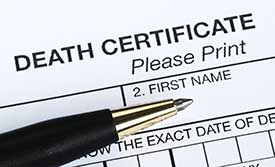
Coordinating Death Certificate Completion
The Medical Certifier Worksheet must be completed by the certifying physician or medical examiner prior to the release of the body. You will work with the city/town clerk for data entry….
Caring For Your Own Procedures
Highlighting required forms, upon death in Massachusetts
We recommend reviewing the Guide Issues to Consider in Preparing for Disposition of Decedents for most recent guidelines regarding death certificates in Massachusetts.
- Obtained from the Certifier:
Certifier Worksheet from an offline certifier or an Attestation Copy form from an online certifier, but this may vary somewhat by practice and facility. If a Registered Nurse Pronouncement of Death Form (R-312) is used to move the remains initially, a certification of death must still be obtained from the certifier.
- Attending physician, if an expected death at home, Do not call 911 as they will then be required to attempt resuscitation which will be distressing if clear person is dead.
- Attending physician if death in hospital,
- In the case of an unexpected death at home, call the family doctor if there is one. However, an unexpected death will probably trigger the Medical Examiner becoming involved who will then become the certifier.
The family designee will then work with the City or Town Clerk in the community where the death occurred to complete an online record of death, by providing the Clerk with the Certifier Worksheet, Nurse Pronouncement Form, and a completed Informant Worksheet that will provide the legal and personal information about the decedent. The City or Town Clerk will enter the information into the EDRS, and release the electronic record to the burial agent for review prior to issuance of a burial permit. See “Coordinating the Completion of the Death Certificate” for more information on the specific forms you will need to fill out.
- Disposition/Removal permit — Obtained from local Burial Agent when Death Certificate is filed. This also serves as your transit permit, required for transporting a body from one town to another.
- For cremation you will also need a Cremation Authorization Order
Obtained from the crematory and required by them for their legal protection: Authorization from next of kin of the decedent for cremation.- Order of next of kin: spouse, or, if none, then children (all adult children must sign, and if sending in authorization by fax it must be notarized and the original sent by mail, if from another country consulate should verify the identity).
- If decedent signed and notarized a Declaration of Intent Regarding Cremation during his/her lifetime this will be helpful in convincing family members, but is not sufficient for the crematory who will still require the above Cremation Authorization Order. The Declaration of Intent Regarding Cremation can be used to authorize one person to sign the next of kin Cremation Authorization Order.
- Medical Examiner — Cremation Fee Form — Pick up the yellow copy of this form from the crematory at the time you pick up the cremains (cremated remains). The $100 cremation authorization fee must then be sent in directly to the state Office of the Chief Medical Examiner





